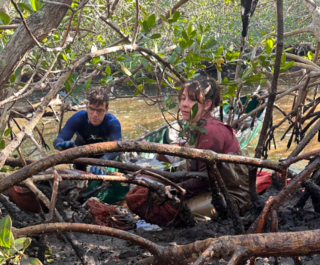
Mangrove Resilience and Restoration
Brad Oberle and collaborators
Mangroves are among the most impactful and imperiled habitats on earth. As unusual saltwater swamps, mangroves cover a tiny fraction of earth’s coastlines and comprise just a few dozen species of trees. However, they contribute disproportionately to climate change resilience. Mangroves store more carbon per unit area than any other forest type, while simultaneously cleaning water and supporting valuable fisheries. Mangroves can even keep pace with sea level rise by building land below themselves. Despite these valuable services, mangroves have been degraded for development and aquaculture. My research seeks new understanding of mangrove resilience by connecting changes in ecosystem services to key stressors. With interdisciplinary teams, I have shown how public access to restored mangroves incurs a cost to carbon storage, as does invasive species removal for biodiversity enhancement. My future work seeks apply these principles to mangroves worldwide and generalize results to other wetlands around New York City.

Brad (left) removing bagged invasive species mulch as part of an EPA-funded experimental mangrove restoration project in Cortez, FL.